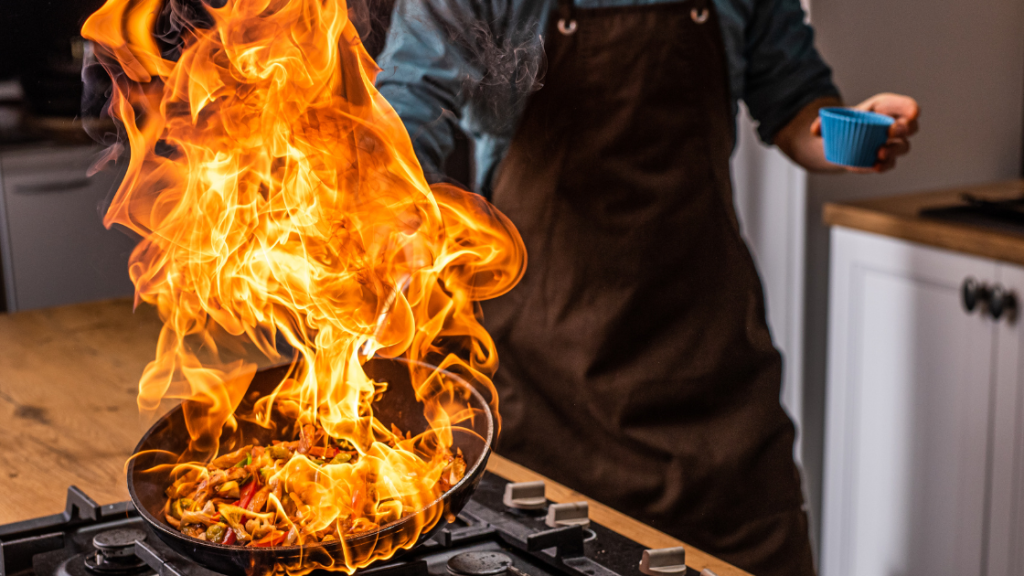5 Tiny Morning Rituals That Set the Tone for a Calmer Day & How to Make Them Stick
Start your day with softness. These five tiny morning rituals create calm, reduce overwhelm, and help you ease into your mornings with intention.

Parenting comes with its fair share of stressful moments, but few compare to the sheer panic of a kitchen fire. In the UK, where nearly 50% of all accidental house fires start in the kitchen, it’s essential to be prepared—not just with fire safety knowledge but also with the ability to stay emotionally composed in front of your child. How you react can shape their understanding of emergencies and influence their confidence in handling stress.
Here’s how to effectively manage the fire and your emotions when disaster strikes at home.
When you see flames, your heart rate may spike, and panic can set in. But before you jump into action, take a deep breath. This moment of composure helps slow your thoughts and allows you to assess the situation rationally. Your child is watching,if you remain calm, they’re more likely to follow suit.
Even if you feel overwhelmed, your body language and voice need to project confidence. Keep your tone firm but reassuring when giving instructions like:
This approach can keep your child from panicking and reinforces trust that you are in control of the situation.
Understanding how to tackle a kitchen fire is key. Different types of fires require different responses:
Most UK homes are required to have smoke alarms fitted, but it’s also worth investing in a fire blanket and extinguisher for your kitchen. Knowing these steps beforehand can help you stay emotionally collected if a fire ever happens.
A fire is scary, but it’s important to regulate your emotions rather than letting fear take over. A few ways to stay emotionally steady include:
If your child sees you manage your stress, they will learn that staying calm in difficult situations is possible.
Once the situation is under control, take time to reflect and talk through what happened with your child. Without instilling fear, help them understand the importance of:
Turning fire safety into an open and calm discussion helps normalise preparation without making it a scary topic.
Even if the fire was small, both you and your child may feel shaken afterwards. It’s okay to acknowledge that it was scary, but follow it up with reassurance:
If your child seems particularly anxious, encourage them to talk about their feelings. You might even watch fire safety videos together or read books about emergency preparedness to reinforce a sense of security.
Once the crisis is over, don’t forget to care for yourself too. Dealing with an emergency is emotionally draining. Take a few moments alone to breathe, have a cup of tea, or talk to a loved one. When you look after your own emotional well-being, you’re in a better position to support your child.
Home fire safety is essential, but so is managing our emotions during a crisis. We teach our children resilience by staying calm, controlling our reactions, and using the experience as a learning opportunity. Emergencies happen, but what matters most is how we handle them—because our children are always watching and learning from us.
A heartfelt thank you to Satinder for this insightful blog!
Start your day with softness. These five tiny morning rituals create calm, reduce overwhelm, and help you ease into your mornings with intention.
Make AI your productivity sidekick: 10 clever ways to use ChatGPT each day so you reclaim time, reduce hassle and focus on what really matters.
Not all online matches are as perfect as they seem. While a little mystery can be intriguing, some things just don’t add up—and that’s where the red flags start waving. From love bombing to financial excuses, here are the biggest warning signs to look out for when meeting someone online.
Did you know asparagus has been enjoyed since ancient times? This National Asparagus Day (April 23rd), discover the history and health benefits of this springtime favourite, plus three easy and delicious ways to cook it. Whether roasted, poached, or blended into a creamy soup, let’s celebrate this vibrant green veggie together!
Wondering what to do with those leftover boiled potatoes? This super simple, satisfying salad is light, fresh, and customisable. The perfect bite for warm weather days.
Rethinking your wardrobe doesn’t mean sacrificing style. From capsule wardrobes to second-hand finds and ethical brands, here’s how to dress with purpose—and make fashion choices that last.